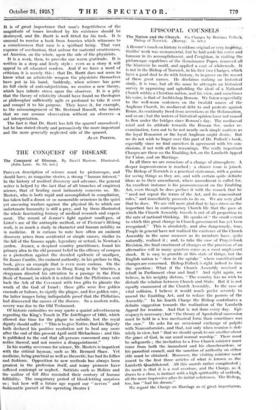• THE CONQUEST OF DISEASE
The Conquest of Disease. By David Masters. Illustrated. (John Lane. 8s. 6d. net.) The Conquest of Disease. By David Masters. Illustrated. (John Lane. 8s. 6d. net.)
POPULAR description of science must be picturesque, and should have, as magazine stories, a strong " human interest." In the history of medical discovery and advance, the general writer is helped by the fact that of all branches of empirical science, that of healing most intimately concerns us. Mr. Masters, who is both rapid and accomplished in compilation, has taken half a dozen or so memorable occasions in the quiet yet unceasing warfare against the physical ills to which our unfortunate humanity is still a prey, and by them illustrated the whole fascinating history of medical research and experi- ment. The record of Jenner's fight against small-pox, of Lister's use of the antiseptic method, or of Pasteur's lifelong work, is as much a study in character and human nobility as in medicine. It is curious to note how often an eminent discovery arises from accidental or simple causes, similar to the fall of the famous apple, legendary or actual, in Newton's garden. Jenner, a despised country practitioner, found his primary idea in the old peasant belief in the efficacy of cowpox as a protection against the dreaded epidemic of smallpox. Sir James Cantlie, the eminent authority, in his preface to this book, gives an example that is even more curious. On the outbreak of bubonic plague in Hong Kong in the 'nineties, a clergyman directed his attention to a passage in the First Book of Samuel, in which it is related that the Philistines sent back the Ark of the Covenant with two gifts to placate the wrath of the God of Israel ; these gifts were five golden emerods or buboes, to signify the plague, and five golden rats ; the latter images being indisputable proof that the Philistines had discovered the causes of the disease. So a modern redis- covery was due to the Old Testament.
Of historic curiosities we may quote a quaint advertisement regarding the King's Touch in The Intellingcer of 1665, which allowed due time for the plague to subside, lest the royal dignity should suffer : " This is to give Notice, that his Majesty bath declared his positive resolution not to heal any more after the end of this present April until Michaelmas : and this is' published to the end that all- persons concerned may take notice thereof, Sand not receive a disappointment."
In his worthy reverence for science, Mr. Masters is impatient with the critical layman,- such as Mr. Bernard Shaw. Yet Medicine, being practical as well as theoretic; has had its follieS and- fashions. Opposition to new methods has always been greatest in the profession itself, and many 'pioneers have- suffered contempt or neglect. Satirists such as Moliere and the author of Gil Blas reminded their century of human fallibility. The sanguinary period of blood-letting surprises us ; but how will a future age regard our nerves " and fashionable pursuit of the operating theatre






























































 Previous page
Previous page